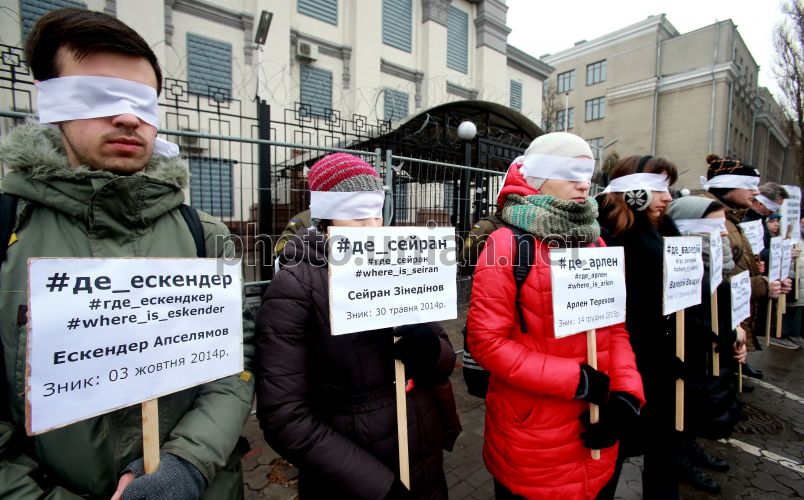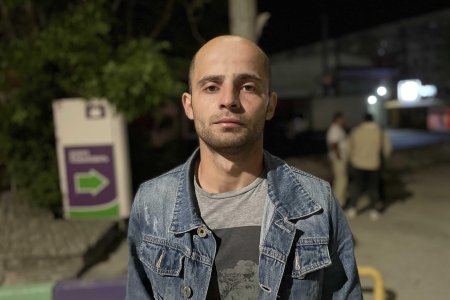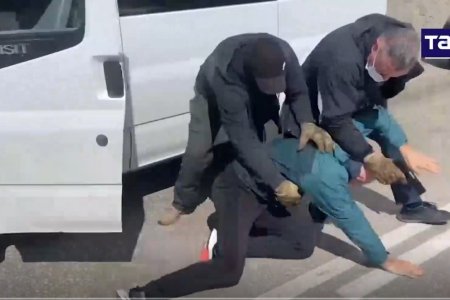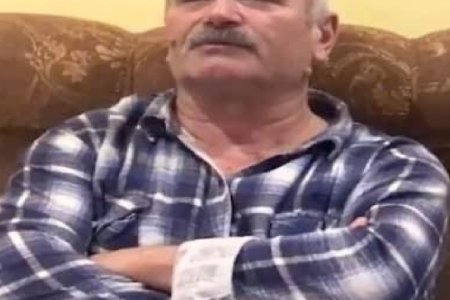
It will soon be eight years since Ervin Ibragimov, member of the Executive Committee of the World Congress of Crimean Tatars, was abducted on 24 May 2016, after being stopped by men in traffic police uniform as he was returning to his home in Bakhchysarai, occupied Crimea. He disappeared without trace, with the occupation authorities’ lies and failure to properly investigate compounding the suspicion that they knew very well who was behind the abduction. This was one of many enforced disappearances, often targeting Crimean Tatar or other Ukrainian civic activist, since Russia’s invasion and annexation of Crimea, but was particularly shocking given the CCTV footage implicating Russia’s traffic police in his abduction.
Nor was it the only occasion when Russia’s traffic police appear to have been deployed for purposes that have nothing in common with ensuring road safety, as a recent study by Lutfiye Zudiyeva, prominent Crimean Tatar human rights defender and Graty correspondent has shown. Her interviews with victims of traffic police detentions and abductions, many of whose stories were reported earlier, make it clear that the traffic police are carrying out instructions for other bodies, most often the FSB, Russia’s security service.
Zudiyeva spoke with lawyer Emil Kurbedinov, both about the investigation, or lack of such, into Ervin Ibragimov’s abduction, and about the role of the traffic police in his own persecution.
As reported earlier, the FSB initially refused to even register Ibragimov’s abduction, and only initiated an investigation after a large group of people joined Ervin’s father, Umer Ibragimov, outside the FSB building. The Investigative Committee did initiate criminal proceedings into the abduction and add the CCTV footage to the case, but did nothing. Seven months after his son’s abduction, Umer Ibragimov reported that it was only Irvin’s friends who were trying to find him, with the enforcement bodies instead setting up surveillance of him and his wife.
Kurbedinov reports that after, having achieved “absolutely nothing”, the ‘investigation’ was suspended. The same can be said about a number of other abductions, with it difficult to obtain answers even to formal lawyer’s requests for information.
Kurbedinov’s tireless defence of Russia’s ever-mounting number of Crimean Tatar and other Ukrainian political prisoners has made him a target of persecution. He was first detained on 26 January 2017 while heading with fellow rights lawyer Edem Semedlyaev to the home of another victim of persecution, and subsequently jailed for ten days over an entirely innocuous social media post from a year before Russia’s invasion of Crimea. Kurbedinov explains that it was the traffic police who initially stopped him in Bakhchysarai, with Ruslan Shambazov and other notorious officials from Russia’s so-called ‘Centre for countering extremism’ turning up soon afterwards. Kurbedinov later made a formal approach to the traffic police, demanding an explanation. He says that the traffic police were quite open in telling him that he had been stopped “on the instruction of other bodies”.
Worth noting that the same instructions were doubtless issued to the traffic police who stopped Ukrainian freelance journalist Vladislav Yesypenko while he was carrying out a journalist task for RFE/RL’s Crimean Realities. The FSB appeared and took him away, after imitating a search of his car. He was held incommunicado for many days and subjected to torture, before being ‘tried’ and convicted of carrying the grenade that the FSB pretended to have found (in a compartment in which it did not fit). He is currently serving a five-year sentence, although his account of torture is backed by the fact that his ‘confession’ on Russian propaganda TV differed significantly from the final indictment.
Other ‘services’
Zudiyeva reports that the traffic police are constantly deployed to surround Crimean Tatar homes during armed searches, as well as outside ‘court hearings’ in prominent political trials to prevent relatives and friends of the political prisoners from gathering. Over recent years, Russia has increasingly carried out mass detentions in such cases, with occupation ‘courts’ almost invariably ‘convicting’ people who had merely sought to be present outside the ‘court’ building on preposterous charges and either fining them or sentencing them to up to 15 days’ imprisonment.
The traffic police have also helped effectively abduct Crimean Tatars who were later tortured by the FSB.
As reported, Mambet Asan-Usta, a young father of two, disappeared during the evening from 18 to 19 May 2023, after being stopped by the traffic police while towing his car which had broken down. The car had Crimean, not Russian, number plates, but this was clearly only a pretext for getting him to go with the officers who claimed, among other things, that they did not have any spare forms. Asan-Usta has told Graty that he had noticed two cars which appeared to be following him earlier that day. At the time, however, there seemed nothing untoward about the traffic police officers’ behaviour and he agreed to go with them to the occupation ‘police station’, with the officers promising that this would take no more than half an hour.
After drawing up an administrative offence protocol (over Mambet’s lack of mandatory Russian medical insurance), the officers claimed that they would take him back to his car, and made some excuse for why they were leaving the station through the back door. The reason soon became evident, as several men in camouflage got out of a minivan, bound his hands behind his back and covered his eyes and his mouth, to stop him calling out for help, as they forced him into a Volkswagen minivan. They put a bag over his head, securing it with scotch tape and began beating him. He was taken to some building where the ‘interrogation’ began, with the men demanding to know about his ‘links with Ukraine’. He was told that he would never see his family again if he did not sign various documents, apparently ‘confessing’ to the explosion on a railway track in the village of Chystenke, nine kilometres from Simferopol, early in the morning on 18 May 2023.
He dismissed any such allegations, and did not sign the documents. It is likely, however, that he was released that night because his wife had formally reported his abduction and a large number of relatives, friends and civic activists gathered around the ‘police station’.
A month later, Eldar Mensitov, a 50-year-old chef from Molodizhne and a former member of the Simferopol Regional Mejlis of the Crimean Tatar people, was subjected to similar torture by the FSB after first being detained and tricked into going to a ‘police station’ by traffic police. He was ‘interrogated’ through the night from 9-10 June 2023 about an act of sabotage on the railways, and was in such a state due to the torture that he signed what the FSB put in front of him, without reading it. He was later prosecuted for supposedly ‘disobeying an enforcement officer’ and imprisoned for 15 days. While imprisoned, he needed urgent medical care. Instead of an ambulance, however, masked men appeared and threatened “to come for him again” and later interrogated him over his earlier involvement in the Mejlis.
These were just two of very many such effective abductions of Crimean Tatars by the FSB. It is likely from those occasions, as well as those earlier reported, that the real number is even higher, since it takes considerable courage to ignore the direct threats of grave reprisals against the victims and their families if they reveal their experiences.
See, for example, Russia escalates use of torture to fabricate ‘evidence’ against imprisoned Crimean Tatar leader Nariman Dzhelyal



